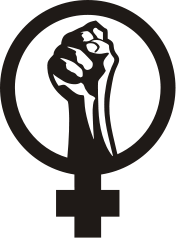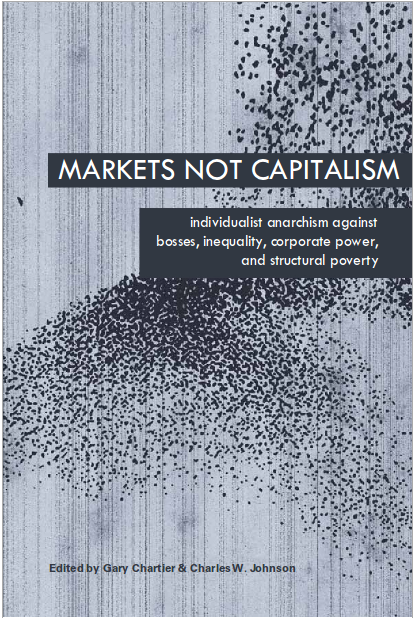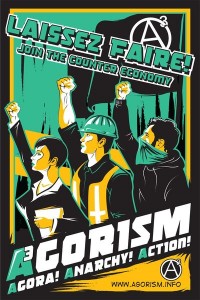 Just what is “left-libertarianism?” The term (as it’s being used here) points to a broad tradition of intellectual undercurrents that are simultaneously radically libertarian and radically leftist. It includes some of the most radical elements of English liberalism (such as Thomas Hodgskin and the earlier writings of Herbert Spencer), nineteenth-century individualist anarchism, the 1960s alliance between free market anarchists and the New Left, and the contemporary resurgence of left-wing market anarchism.
Just what is “left-libertarianism?” The term (as it’s being used here) points to a broad tradition of intellectual undercurrents that are simultaneously radically libertarian and radically leftist. It includes some of the most radical elements of English liberalism (such as Thomas Hodgskin and the earlier writings of Herbert Spencer), nineteenth-century individualist anarchism, the 1960s alliance between free market anarchists and the New Left, and the contemporary resurgence of left-wing market anarchism.
“Left-libertarianism” has also been used to describe anarcho-communism (and other non-market forms of anarchism), as well as a group of theorists in academic political philosophy that affirm self-ownership while rejecting property in natural resources, and attempts to combine moderate forms of libertarianism with progressivism and modern American liberalism. However, these uses are mere homonyms and have nothing to do with “left-libertarianism” as described here.
It’s probably impossible to come up with any concise, neat, and fully exhaustive definition of what ties together the general cluster of ideas that fall under “left-libertarianism,” and there will be clear counter-examples for any attempt at doing so. However, here are three of its most important features.
A Deeper Commitment to Individualism
 One way of defining left-libertarianism is to say that it combines standard radical libertarian views about non-aggression with standard radical leftist views about non-domination. A thorough-going individualism connects their opposition to institutions (such as the state) that repress individuals through actual threats of aggressive force to a more general resistance against any social arrangement that subordinates one individual (or group of individuals) to another individual (or group of individuals).
One way of defining left-libertarianism is to say that it combines standard radical libertarian views about non-aggression with standard radical leftist views about non-domination. A thorough-going individualism connects their opposition to institutions (such as the state) that repress individuals through actual threats of aggressive force to a more general resistance against any social arrangement that subordinates one individual (or group of individuals) to another individual (or group of individuals).
More concretely, this means opposing more informal power structures like sexism, racism, and managerial capitalism (more on this soon). Hence why left-libertarians often stress the importance of markets as a cultural force that can accommodate wide social variation, and undercut those oppressive dynamics.
This intersectional individualism can be found at least as far back as Herbert Spencer’s Social Statics, where he charges that “despotism in the state is necessarily associated with despotism in the family.” Such was also the attitude of the individualist anarchists, who were not only nineteenth century America’s most radical free marketers, but also at the forefront of its feminist movement. So much so that Moses Harman was jailed under obscenity laws for publishing open and honest attacks on the then completely legal practice of marital rape. Voltairine De Cleyre discusses the incident here in her essay “Sex Slavery.”
Free Market Anti-Capitalism & Libertarian Class Analysis
 When reading the various social arrangements that left-libertarians oppose in virtue of their leftism, “capitalism” probably stood out as odd, given that left-libertarians are still libertarians. Yet for the left-libertarian, it should be understood that “capitalism” does not refer to the market economy, laissez faire, entrepreneurship, private property, or anything else that libertarians who identify with that word typically have in mind. In fact, individualist anarchist Benjamin Tucker considered private property so important to liberty that he refused to consider anarcho-communists such as Peter Kropotkin and Johann Most actual anarchists, due to their rejection of it.
When reading the various social arrangements that left-libertarians oppose in virtue of their leftism, “capitalism” probably stood out as odd, given that left-libertarians are still libertarians. Yet for the left-libertarian, it should be understood that “capitalism” does not refer to the market economy, laissez faire, entrepreneurship, private property, or anything else that libertarians who identify with that word typically have in mind. In fact, individualist anarchist Benjamin Tucker considered private property so important to liberty that he refused to consider anarcho-communists such as Peter Kropotkin and Johann Most actual anarchists, due to their rejection of it.
Rather, “capitalism” in this context refers to things like large concentrations of wealth in a relatively small number of hands, and the social dominance of managers and capitalists over labor and society more generally. Part of left-libertarians’ rejection of capitalism, then, is due to their broader ethos of individualism, but another part comes from a belief that top-down, hierarchical firms are wildly inefficient.
Due to problems like those of knowledge and agency, genuinely free market competition would eat top-heavy organizations alive. This would largely eliminate corporate dominance, leaving flatter alternatives like cooperatives and independent contracting in its place. Contemporary left-libertarian Kevin Carson argues this at length in his Organization Theory: A Libertarian Perspective.
So if authority in the workplace is so inefficient, why is it so pervasive? In short: government.
The economic environment we live in is not a free market, but one where certain sorts of organizations are made artificially efficient and others artificially inefficient, due to the institutional backdrop of massive state intervention.
Left-libertarians reject views that frame big business and government as either enemies or irrelevant to one another, instead stressing a fundamental interdependence. It is in government’s very nature that it will be used by those who are already wealthy or otherwise socially powerful in order to extract resources from the rest of us.
During Murray Rothbard’s time on the left, this focus on power elite theory and libertarian class analysis took center stage. Due to influence from New Left historians like Gabriel Kolko, free market radicals began to attack the standard mythology about how regulation exists to protect us from domination by the rich. As Roy Childs argued in “Big Business and the Rise of American Statism,” the truth is the opposite: sharp increases in regulation have come about as a means of protecting the social position of the wealthy.
A Direct Action View of Social Change
 If left-libertarians are right about how states necessarily gravitate towards securing domination and exploitation, this may make political action look hopeless. Indeed it is, if your view of political action consists in electoral efforts and other “policy”-centered approaches.
If left-libertarians are right about how states necessarily gravitate towards securing domination and exploitation, this may make political action look hopeless. Indeed it is, if your view of political action consists in electoral efforts and other “policy”-centered approaches.
Instead, left-libertarians tend to focus on interacting directly with the thing they’re trying to change (society), rather than making appeals to the thing they want to eliminate (the state). Not only does this include educational efforts, but also find methods for circumventing state repression and building alternative institutions for handling problems states create or fail to solve.
Historically this includes experiments like Lysander Spooner’s American Letter Mail Company, the radical labor efforts of Dyer Lum, and Sam Konkin’s idea of “counter-economics.” Today it can be found in left-libertarian enthusiasm for projects like crypto-currencies, radical labor activism, 3D printing, file-sharing, grass-roots mutual aid, and cop-watching.
As Kevin Carson explains, the left-libertarian aim “is not to overthrow the state, but to ignore it. Anyone who wants to continue to support the state and obey its laws is free to do so, so long as they leave us alone. Our goal is to build the kind of society we want, and prevent the state from overthrowing us while we’re doing it. The last person out of the state can turn off the lights.”
There are plenty of other issues that make left-libertarians distinct, and the aspects discussed here have only been given at most a cursory glance.







